HIGHLIGHTS

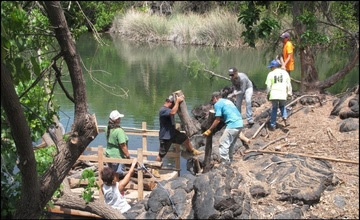
$1.2 Million for Habitat Focus Area Projects
NOAA recommends $1.2 million in FY 2018 funding to partners working in our Habitat Focus Areas, which are targeted places where we collaborate with communities on strategic habitat restoration for lasting improvements. The funding would support seven existing multi-year projects in Habitat Focus Areas across the nation.
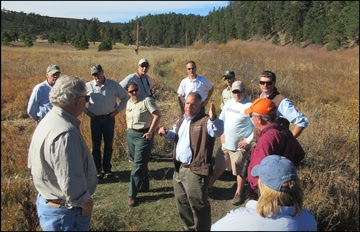
The National Fish Habitat Partnership at 10 Years
The National Fish Habitat Partnership is a science-based, state-led initiative to protect, restore, and maintain America’s aquatic ecosystems. The national partnership unites a network of diverse partners with a wide array of expertise to protect, restore, and enhance the nation’s fish and aquatic communities. Learn more about their first 10 years of success.

2018 Habitat Month Photo Contest Winners
NOAA and partners are working to conserve habitat for sustainable fisheries, protected species, and resilient coastal ecosystems and communities. To help celebrate that work during NOAA’s Habitat Month, we invited NOAA staff and the public to submit photos that captured these habitats. Check out the 2018 winning photographs.

Explore NOAA’s Veteran and Conservation Corps
Veteran and Corps programs are enhancing workforce development and opportunities for higher education in the natural resources field, while restoring coastal habitat to support healthy fisheries, fishing communities, and NOAA trust resources.
Alaska

Video: Restoring Kachemak Bay Ecosystem
Alaska’s Kachemak Bay Habitat Focus Area supports important recreational, subsistence, and commercial fishing. The region has experienced significant declines in shrimp and crab populations that have not recovered despite fishery closures. NOAA is working with many partners to study the bay ecosystem, monitor invasive species, and develop risk assessment tools.

Innovative Technology for Fish Age Data Collection
NOAA Fisheries scientists are evaluating the use of machine-based technology in determining fish age from otoliths. Initial results using Bering Sea walleye pollock otoliths suggest the technology could greatly increase the speed and cost-effectiveness of determining fish ages, which would more efficiently generate critical data for stock assessments.

North Pacific Council Seeks Analyst/Economist
The North Pacific Fishery Management Council seeks a Fishery Analyst/Fishery Economist to work in the identification and analysis of economic, social, and environmental issues pertaining to fisheries management off Alaska. Applications are due August 24.
Southeast

South Atlantic Red Grouper Final Rule
NOAA Fisheries announced a final rule for red grouper in the South Atlantic. This rule will reduce annual catch limits for South Atlantic red grouper in response to the latest population assessment, which found that the stock is overfished and undergoing overfishing.
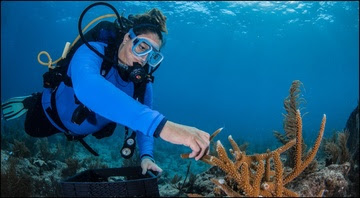
Partnering on Coral Reef Restoration
As part of our Habitat Month focus on partnerships, we interviewed Jessica Levy from the Coral Restoration Foundation, an organization that partners with NOAA to rehabilitate and restore coral reef habitat in the Florida Keys.

International Mangrove Conservation Day
Most commercially and recreationally important fish species in south Florida and the U.S. Caribbean spend some part of their life cycles near mangroves. In honor of International Mangrove Conservation Day (last Thursday, July 26), we highlight the ecology and ecosystem services of these special habitats.

Designating Habitat Areas of Particular Concern
The Magnuson-Stevens Fishery Conservation and Management Act defines Essential Fish Habitat as the waters and substrate necessary for fish to spawn, breed, feed, and grow to maturity. A subset of Essential Fish Habitat are Habitat Areas of Particular Concern, which cover locations or habitats that are particularly rare, important, or stressed. Learn more about the process for identifying and designating these special areas.

Trustees’ Outreach Materials Now Available
Outreach materials from the July 18 and 19 Deepwater Horizon Natural Resource Trustees’ public events are now available online. The events were held to educate and update the public on restoration activities in the Gulf of Mexico.
Greater Atlantic

2019–2021 Herring Research – Call for Proposals
NOAA Fisheries announced a call for proposals for Atlantic herring research support under a program unique to Northeast fishery management—the Research Set-Aside Program. Projects selected through the competition are awarded fishing quota rather than dollars, and they use the proceeds from catching or selling their quota to fund their research. Proposals are due September 20.
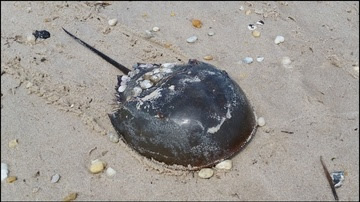
Horseshoe Crabs, an Important Resource
Horseshoe crabs (which are more closely related to scorpions than to crabs) are an important food source for shorebirds. Humans use the animals as bait in the eel and conch fisheries and their blood for pharmaceutical testing. To ensure that horseshoe crab populations remain healthy, their harvest is carefully managed.
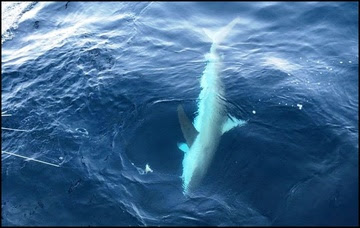
New Insight Revises Shark Ageing Techniques
For decades, researchers have counted growth band pairs in shark vertebrae—thought to be similar to tree rings—to estimate the ages of sharks. However, recent research demonstrates that the band pairs are more closely linked to growth than to time, indicating that previous methods underestimated the ages of older sharks.

More Options for Selecting Scallop Vessel Observer Providers
Atlantic sea scallop vessels that qualify for the industry-funded sea scallop observer program will soon have a fourth provider option to consider. This month, MRAG Americas, Inc., will have certified observers available for hire. NOAA Fisheries is working to improve observer availability during peak fishing periods.
| 
No comments:
Post a Comment